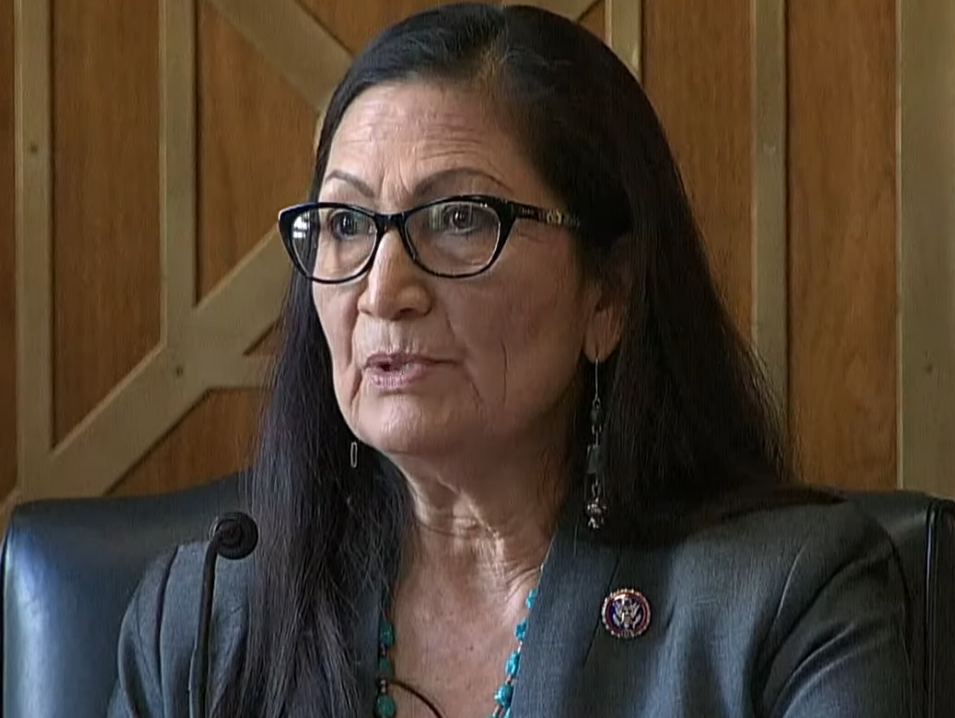
- Details
- By Native News Online Staff
WASHINGTON — U.S. Dept. of the Interior Secretary Deb Haaland on Friday issued two Secretarial Orders that will prioritize action on climate change throughout the Department.
The first Secretarial Order, SO 3399, establishes a Climate Task Force to coordinate work across the Interior Department, including accelerating renewable energy development and identifying actions to foster investments in energy communities. The Order also provides guidance on how science should be used in the decision-making process and improves transparency and public engagement in the Department’s decision-making process.
One key component of SO 3399 is the directive for the Interior Department to engage with tribes to seek their input through tribal consultation. The Order says, “Tribal consultation is a means to rectify this by recognizing the government-to-government relationship and considering Tribal interests in decision making.”
The Order additionally provides policy instruction to ensure that the level of National Environmental Policy Act (NEPA) analysis across DOI bureaus is not diminished, that climate change is appropriately analyzed, and that Tribes and environmental justice communities are appropriately engaged.
"From day one, President Biden was clear that we must take a whole-of-government approach to tackle the climate crisis, strengthen the economy, and address environmental justice,” Interior Secretary Deb Haaland said. “At the Department of the Interior, I believe we have a unique opportunity to make our communities more resilient to climate change and to help lead the transition to a clean energy economy. These steps will align the Interior Department with the President’s priorities and better position the team to be a part of the climate solution.”
The second Secretarial Order, SO 3398, seeks to rectify the reckless Secretarial Orders issued during the Trump administration. SO 3398 revokes a series of Secretarial Orders issued in recent years that are inconsistent with the Department’s commitment to protect public health; conserve land, water, and wildlife; and elevate science. Collectively, those Orders tilted the balance of public land and ocean management without regard for climate change, equity, or community engagement. The new Order does not impact the Interior Department’s ongoing review of proposals for oil, gas, coal, and renewable energy development on public lands and waters.
“I know that signing Secretarial Orders alone won’t address the urgency of the climate crisis. But I’m hopeful that these steps will help make clear that we, as a Department, have a mandate to act,” added Secretary Haaland. “With the vast experience, talent, and ingenuity of our public servants at the Department of the Interior, I’m optimistic about what we can accomplish together to care for our natural resources for the benefit of current and future generations.”
More Stories Like This
Native News Weekly (August 25, 2024): D.C. BriefsNavajo Nation Mourns the Passing of Former Vice President Rex Lee Jim
Deb Haaland Earns Endorsement From Communications Workers of America Local 7076
University Soccer Standout Leads by Example
Two Native Americans Named to Democratic Congressional Campaign Committee's“Red to Blue” Program
Help us defend tribal sovereignty.
At Native News Online, our mission is rooted in telling the stories that strengthen sovereignty and uplift Indigenous voices — not just at year’s end, but every single day.
Because of your generosity last year, we were able to keep our reporters on the ground in tribal communities, at national gatherings and in the halls of Congress — covering the issues that matter most to Indian Country: sovereignty, culture, education, health and economic opportunity.
That support sustained us through a tough year in 2025. Now, as we look to the year ahead, we need your help right now to ensure warrior journalism remains strong — reporting that defends tribal sovereignty, amplifies Native truth, and holds power accountable.
 The stakes couldn't be higher. Your support keeps Native voices heard, Native stories told and Native sovereignty defended.
The stakes couldn't be higher. Your support keeps Native voices heard, Native stories told and Native sovereignty defended.
Stand with Warrior Journalism today.
Levi Rickert (Potawatomi), Editor & Publisher

